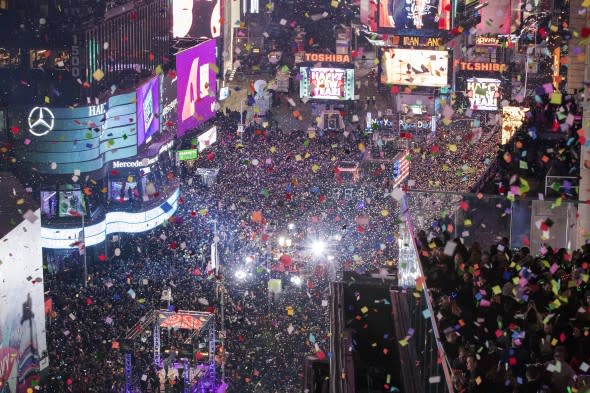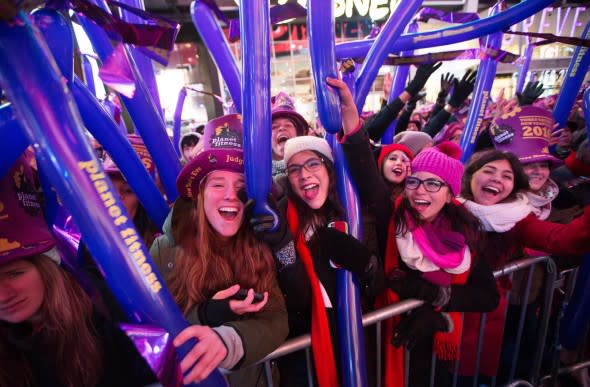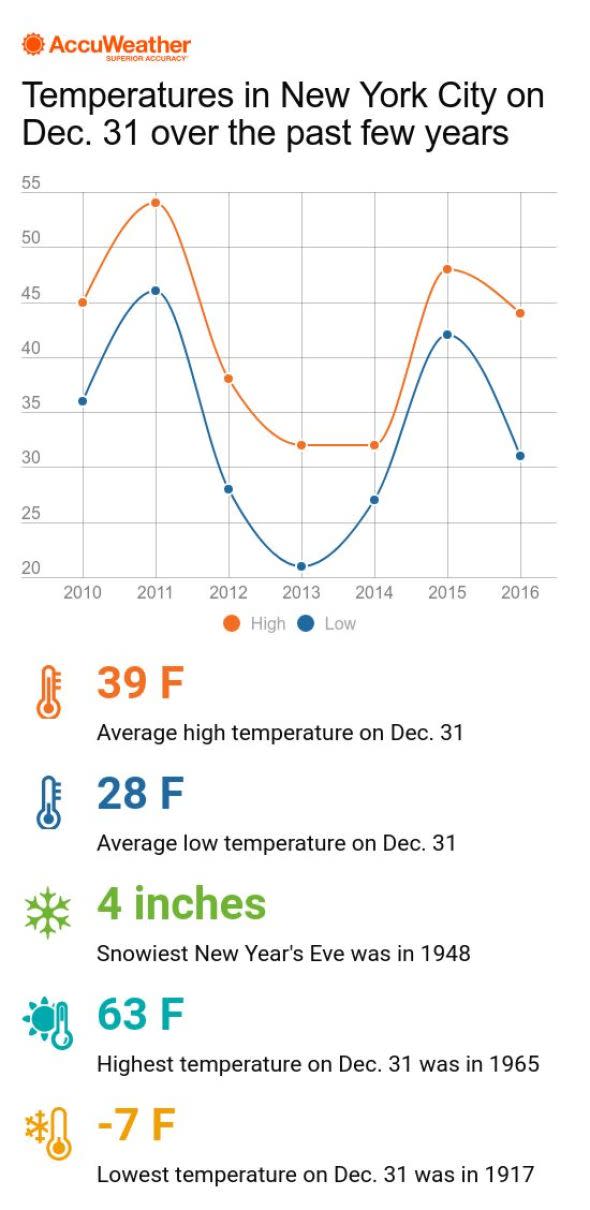How to avoid freezing if you're ringing in the new year in Times Square
Celebrating in Times Square with the masses on New Year's Eve is a grand test of endurance, and if you are going there this year, prepare for low temperatures.
"This could turn out to be one of the coldest New Year's Eves in Times Square in a couple of years, so people attending the big celebration will want to bundle up to keep warm through the first few hours of 2018," AccuWeather Meteorologist Brian Lada said.
"Right now, New Year's Eve in New York City is looking mostly dry and chilly with daytime temperatures in the upper 20s F before dropping into the teens overnight. However, there is the chance that a storm may develop and deliver snow to the area around Dec. 31, so people will want to monitor the forecast closely as the end of the year nears," Lada said.

Throngs of people celebrated the new year in the streets as confetti flew over New York's Times Square as seen from the Marriott Marquis, Sunday, Jan. 1, 2017. (AP Photo/Mary Altaffer)
Here are some tips to keep warm in the Big Apple on New Year's Eve:
Warm winter wear is wise
The average low temperature in New York City on Dec. 31 is 28 degrees Fahrenheit, so once the sun sets, it's likely you'll need to rely on your winter wear strategy to stay as comfortable as possible.
Base layers made of wool, silk or polypropylene hold more body heat than cotton, according to the Centers for Disease Control (CDC).
Wearing several layers of loose-fitting clothing can allow you to regulate your internal temperature - take off a few layers when you feel you're getting too hot and sweaty. Excess perspiration can lead to increased heat loss.
Water-resistant boots are a must, but keep in mind your comfort when you choose your shoes. Once you're in position at Times Square, you're probably not moving very far for hours. An extra pair of warm socks stashed in your pocket or purse may be a lifesaver if the ones you are wearing get wet or too sweaty.
Your coat should be tightly woven, water-repellent and hooded, according to the New York State Division of Homeland Security and Emergency Services.
Accessorize with purpose
Hats, scarves and gloves will add a little individuality or a pop of color to your outdoor fashion look, but these accessories also protect vulnerable parts of your body from wind or frigid air, and they can make all the difference when you're outside for the long haul.
However, experts say mittens are warmer than gloves because your fingers transfer heat when they're next to each other.
Either way, your extremities might benefit from instant warmers that can slide into gloves, mittens, shoes or coat and provide several hours of continuous warmth. An old-fashioned blanket can keep you and your neighbors snuggled together and comfortable.
Prepare to bring additional items in your pockets or small bags/purses. Police officers will search you with a hand-held wand and inspect all of your bags at the entry points. Backpacks, large bags and umbrellas are not permitted, according to the Times Square Alliance.

Revelers -- keeping warm in hats, gloves and scarves -- wave balloons during the annual New Year's Eve celebration in Times Square on Thursday, Dec. 31, 2015, in New York. (AP Photo/Kevin Hagen)
Be aware of dehydration, frostbite, hypothermia
You're allowed to bring water and food, but keep in mind the licensed food and beverage vendors will be kicked out of the viewing area that day, according to the official website of Times Square. Your options include snacks that you bring or eating at a restaurant.
A challenge will be balancing hydration and water intake against the need to use a bathroom. There will be no portable public restrooms in Times Square, so create a plan ahead of time for that. Keep in mind, dehydration can occur in cold weather because of sweating, breathing and increased urine production, according to the Mayo Clinic.
You might yearn for a celebratory swig of champagne or other alcohol in the streets, but be aware that public drinking is illegal in New York City. Also, alcohol causes the body to lose heat, according to the CDC. Alcohol can cause dehydration, so make the best decision for you when it comes to imbibing booze.
Frostbite and hypothermia are serious illnesses associated with extremely low temperatures, so seek medical help if you are experiencing numbness or are shivering for an extended period of time, as reported by experts at the Department of Homeland Security's Ready.gov website.

For more safety and preparedness tips, visit AccuWeather.com/Ready.

